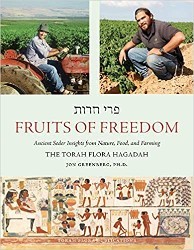One of the major if not the major theme of the Passover seder is transmitting the story of the Exodus from one generation to the next. Ideally, that transmission is conducted through dynamic interaction, questions and answers, and a shared enthusiasm for the Biblical text and its description of the process by which the ancient Israelites left Egypt. Rabbi Forhman’s new work, The Exodus You Almost Passed Over, is a welcome addition to the corpus of Passover-related literature that offers new insights into the timeless story of Passover. Like his earlier works, The Beast That Crouches at the Door (a book on Genesis) and The Queen You Thought You Knew (a book on Esther) this is a smooth, quick read, whose light tone belies its vast scholarship.
Utilizing his characteristic conversational tone (for example, in paraphrasing Moses’ request to Pharaoh to have ALL of the Israelites leave Egypt, Fohrman writes: “We’re talking everybody, Pharaoh — even Sally’s pet sheep, and Bobby’s lizard. How could we leave anyone behind?”) and playful chapter headings (eg. “Much Ado About Names”; “The Journey to Tomorrowland”), Fohrman guides his readers in investigating the word choice and structure of the Bible’s description of the Exodus. Covering topics ranging from exactly how the Israelites were to be considered God’s “firstborn” to the Torah’s description of Jacob’s funeral procession, and employing interpretive strategies ranging from academic-style literary analysis to gematria (Jewish numerology), Fohrman’s work never fails to accomplish the very goal he ascribes to God Himself in the Exodus process — namely, to educate. For example, in his discussion about the Israelites as firstborn, Fohrman notes how such a figure can serve as a “bridge between the generations. A bechor (firstborn) can take the values of the parents and live them, tangibly, in a child’s world. When a child-leader does that successfully, he or she takes a noble idea and breathes life into it, transforming that ideal into behavior that makes sense in a child’s world. That kind of behavior then becomes a real, living possibility for the other children, too.” Such an insight, both into the concept of firstborn-hood in the Bible, as well as in life as a whole, has a particularly salient relevance within the context of the Passover seder — with its theme of transmission and its discussion of the four types of children. On such a night, the value of transmitting, through a measure of transforming, is the center of our focus.
Related Content:
- Reading List: Passover Picks
- Reading List: Children’s Passover Favorites, New and Old
- A Passover Haggadah: Go Forth and Learn by Rabbi David Silber with Rachel Furst
Dr. Stu Halpern is Senior Advisor to the Provost of Yeshiva University. He has edited or coedited 17 books, including Torah and Western Thought: Intellectual Portraits of Orthodoxy and Modernity and Books of the People: Revisiting Classic Works of Jewish Thought, and has lectured in synagogues, Hillels and adult Jewish educational settings across the U.S.





